
I love these
stories about how people went out of their way to do the mitzvah of returning
lost things:
Temima got a phone
call about a year after she returned from a trip to Gibraltar. “A stranger
called me and said he was in Gibraltar and had found a siddur with my name in it. He wanted my address in order to return
it to me. It turns out that the siddur
was a small one that I had gotten from someone’s bar mitzvah. I told the man
that he needn’t bother, but he insisted that he would not give up the
opportunity to do the mitzvah. A few weeks later, the small siddur arrived at my house.”
My sister, who
lives in Israel, told me, “Last Purim my son lost a camera that he was given as
a bar mitzvah present. It was almost Purim again so he had given up hope of
getting it back. Then Tova knocked on our door. She wanted to know if we had
lost a camera. After we told her the brand of the camera, she gave it back to
us. I couldn’t imagine how she knew it was mine.”
Tova explained, “I
saw this camera in the lost and found of the bus company. I had been on the
same bus, so I thought it probably belonged to one of my high school friends. I
brought it home, but since I couldn’t find the owner, it just lay around in my
house for the whole year. Finally, I decided to work on finding the owner. I
looked through the pictures in the camera. I noticed a picture of a popular
store that is right across the street from this apartment building. It seemed
to be taken from inside of one of the apartments. I made a judgment that the picture was taken
from the second floor, so I knocked on the door of the apartments on the second
floor, so here is your camera!”
“This same son
lost an MP3 player on the streets of Bnei Brak,” my sister said. “It had no
identification so we did not think there was any chance at all that we would
get it back. Recently, a man came to our house enquiring about whether we had a
son named Nesanael. He had found the MP3 player, listened to the recordings on
it and heard somebody call the name Nesanael Wiseman. He looked in the phone
book, researched the people with our last name who had a son named Nesanael,
and he found us!”
One more story
that happened to my sister’s family recently: Esti was sent to pay the babysitter
650 shekels. A little while later, the babysitter called and said she had only
received 450 shekels. When Esti was asked, she admitted to dropping the money
on the way and thought that she probably did not find all of it. “We put up a
sign that we were missing 200 shekels and, lo and behold, we got a call very
soon afterwards from someone who had found our money.”
A friend reported
a story that happened many years ago to her. This was in the days of film
photography, and she was in Israel to make some picture documentaries. She had
a knapsack with about $1,000 worth of film for her project, which she left in
the taxi by mistake. Imagine how relieved she was when the taxi driver rang her
doorbell at 2 a.m. and returned the knapsack. He refused to take any money.
* * *
Hashavas aveida, the mitzvah of returning lost
objects, is not a minhag (custom); it
is written clearly in the Torah, in sefer
Devarim. Three pesukim are devoted
to this mitzvah and its details. They say that if you find something that belongs
to another Jew – his animal, his clothing, or anything else – you should take
it into your house and keep it until you find the man and can return it to him.
You should not ignore the lost item and pretend that you did not see it.
I am not sure
whether these stories depict the requirements of the mitzvah of hashavas aveida, or whether these people
did more than was required of them. I asked Rabbi Yossi Rosenfeld,
administrator of the Baltimore Bais Din, about this. He answered, “All these stories illustrate the dedication that Klal Yisrael has to fulfilling the mitzvah of
hashavas aveida. It should be noted that there are many halachos that
govern this mitzvah. Those halachos determine whether one must pick
up the object and seek to return it to the owner, whether one should
not pick up the object at all, or whether he or she may keep the object.”
Rabbi Rosenfeld hopes to write an article dealing with this
topic in an upcoming issue. In the meantime, he mentioned this short list
of some relevant halachic concepts:
·
whether the object has simanim (identifying characteristics)
·
whether the owner can
be assumed to have knowingly given up hope of finding the object (yiush)
·
whether the majority of
the people in the area are Jewish or not
·
whether it seems that
the owner intentionally left the object where it is
Whatever the
halachic particulars, perhaps the moral of the stories above is that the finders
did not just sit back and give up. They used creative thinking and energy to do
this mitzvah. Return a lost object is a mitzvah that anyone can do for anyone
else. You just have to care enough to make the effort!






